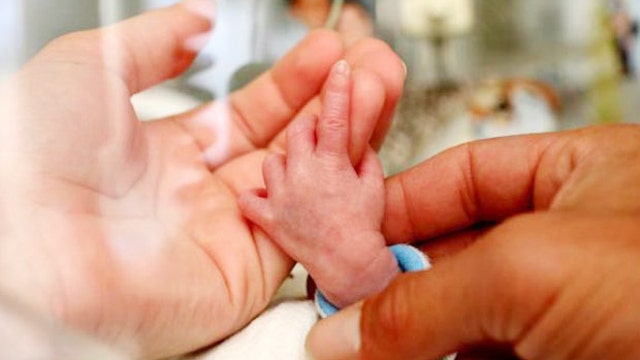New study may change when life is considered 'viable'
Research: Premature babies may survive at 22 weeks if treated
They weigh as little as a pound yet force some of the toughest choices in all of medicine. Extremely premature babies face big differences in how hard hospitals try to save them, a study finds.
It is the first major look in the U.S. at how preemies fare according to the care they get.
There was a wide range - some hospitals always gave active treatment to the youngest preemies as opposed to just comfort care, but others never did. Researchers had no information on how parental wishes affected the decisions versus hospital policy, but said that probably was not the main factor because differences in care from one place to another were so large.
Parents need to know that "the hospital that you go to might determine what happens to your baby," although many parents are not in a position to shop around when they find themselves in these emergency situations, said one study leader, Dr. Edward Bell of the University of Iowa.
They also should be given better information on survival odds - not just by gestational age but also by what happens if active care is given, said another study leader, medical student Matthew Rysavy.
"A doctor might say `no 22-week infant has ever survived,'" but that might mask the fact that doctors there don't try, because they don't consider such babies viable, he said.
Trying is not always the right thing to do, and could just prolong dying, independent experts said. Survival odds are influenced by many factors besides care, such as whether the baby is a twin, and even gender - girls tend to fare better.
"We just seem to be resuscitating more and more tinier babies, and there are consequences," said Dr. Jonathan Muraskas, a neonatologist at Loyola University Medical Center in Maywood, Illinois.
Despite medical advances, the rates of cerebral palsy, blindness, deafness, asthma and other major problems have not changed much, he said.
"How low do we go and what are the implications?" he said.
The study is in Thursday's New England Journal of Medicine.
About 12,000 babies each year in the United States are born between 22 and 25 weeks gestation. A full-term pregnancy is about 40 weeks.
Tundi and Nate Brady faced this twice, with different outcomes, when she went into labor with twins around 23 weeks into her pregnancy at University of Iowa Hospitals and Clinics. When the first twin was born, "it was very clear" that doctors did not think she would survive, so the couple declined life support and the baby died 20 minutes later, Tundi Brady said.
But then her labor stopped and she was able to go another week until her son, Dexter, was born weighing about a pound. Doctors estimated he would have a 40 percent chance of surviving and a 70 percent chance of disability if he did.
"That was good enough for us," so they chose aggressive treatment, she said. He spent five months in a neonatal intensive care unit and is now a healthy 5 1/2-year-old whose only major medical issue is needing oxygen when he sleeps.
"We were so lucky," she said.
The study involved nearly 5,000 babies born before 27 weeks gestation at 24 hospitals in a research group run by the National Institutes of Health between April 2006 and March 2011.
Researchers looked at rates of comfort care versus active treatment, such as breathing machines, feeding tubes or heart resuscitation. Active treatment was given to 22 percent of babies born at 22 weeks, 72 percent of those at 23 weeks and nearly all beyond that.
Survival rates were higher for the actively treated babies - 23 percent versus 5 percent for all babies in the study born at 22 weeks, and 33 percent versus 24 percent for those born at 23 weeks.
Survival without severe impairment also was higher with treatment: 15 percent versus 3 percent at 22 weeks, and 25 percent versus 18 percent at 23 weeks.
Four hospitals never actively treated babies at 22 weeks, but five other hospitals always did.
Hospitals' actions had "a dramatic influence" on how infants fared, Dr. Neil Marlow of University College London commented in the journal. Just giving parents survival statistics without saying whether treatment was attempted "is misleading and helps to make poor survival a self-fulfilling prophecy," he wrote.
